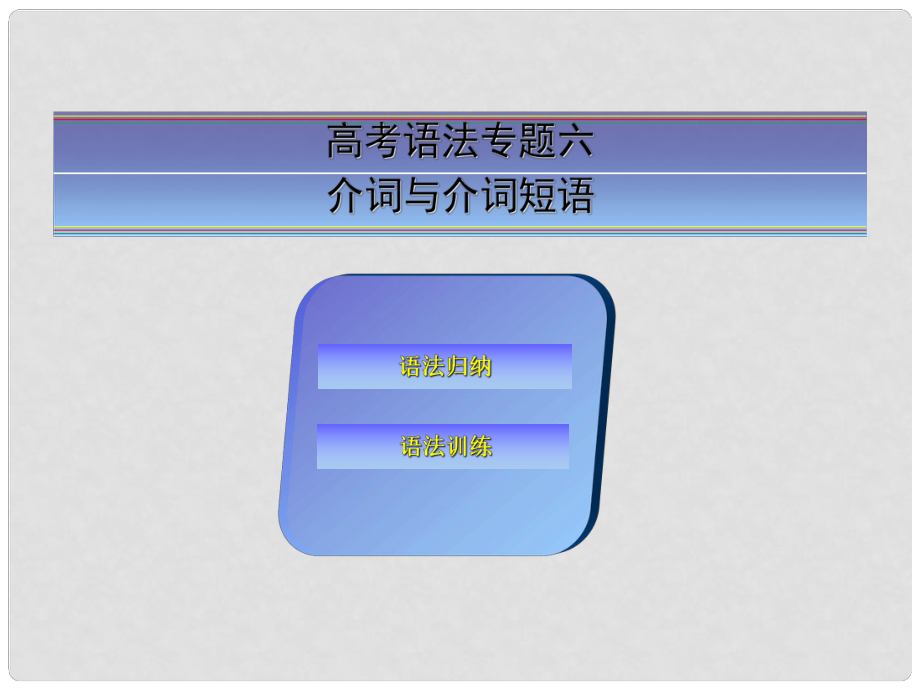《高考英語(yǔ)一輪復(fù)習(xí) 語(yǔ)法專(zhuān)題訓(xùn)練 介詞與介詞短語(yǔ)課件 新人教版》由會(huì)員分享�,可在線閱讀����,更多相關(guān)《高考英語(yǔ)一輪復(fù)習(xí) 語(yǔ)法專(zhuān)題訓(xùn)練 介詞與介詞短語(yǔ)課件 新人教版(25頁(yè)珍藏版)》請(qǐng)?jiān)谘b配圖網(wǎng)上搜索���。
1�����、對(duì)應(yīng)學(xué)生用書(shū)對(duì)應(yīng)學(xué)生用書(shū)P P189 189 語(yǔ)法歸納歸納語(yǔ)法歸納語(yǔ)法 分類(lèi)詳解分類(lèi)詳解一����、介詞介詞不能單獨(dú)做句子成分�����,必須與名詞或代詞(或相當(dāng)于名詞的其他詞類(lèi)��,短語(yǔ)或從句)構(gòu)成介詞短語(yǔ)��,才能在句中充當(dāng)一個(gè)成分�����。1作定語(yǔ)The key to the door is missing.門(mén)鑰匙不見(jiàn)了�����。2作狀語(yǔ)Marx stayed in Belgium for some time and then went to France.馬克思在比利時(shí)呆了一段時(shí)間,然后去了法國(guó)�����。3作表語(yǔ)Japan is to the east of China.日本在中國(guó)東邊����。4作賓語(yǔ)補(bǔ)足語(yǔ)Make yourself at
2、home.請(qǐng)不要拘束�。5注意幾組常用介詞的區(qū)別(1)in/at小地方用at����;大地方用in.He arrived in Beijing at noon.他中午到達(dá)北京。He arrived at a small village before dark.天黑前他到了一個(gè)小村莊�。(2)in/afterin時(shí)間段:一般用于將來(lái)時(shí);after時(shí)間段:一般用于過(guò)去時(shí)����。Hell be back in a week.他一周后回來(lái)。He returned after a week.他一周后回來(lái)了��。(3)in/onin表示一段時(shí)間�;on表示具體某天����。He usually goes to school in the
3�、 morning.他通常上午上學(xué)。He usually stays at home on Sunday morning.他通常周日上午在家����。(4)besides/except/except forbesides表示“除了以外,還有”����;而except表示“只有除外”;except for一般表示“美中不足”Besides Tom���,we also went to see the film.(Tom也去了)除了湯姆���,我們也去看電影了。We all went to see the film except Tom.(Tom沒(méi)去)除了湯姆沒(méi)去��,我們都去看電影了��。Your composition is go
4����、od except for some spelling mistakes.你的作文很好�,只有一些拼寫(xiě)錯(cuò)誤����。(5)above/over/onabove表示在數(shù)目,價(jià)格��,能力等方面“超過(guò)”�����;在位置方面“在上方”��,反義詞是below�。The old man must be above 100.這位老人一定超過(guò)了100歲。The text is above me.這篇課文我理解不了����。He used to work in the tower above the river.他曾經(jīng)在這條河上方的燈塔里工作過(guò)�。over表示數(shù)目等“超過(guò)”;在位置方面“在正上方”��,反義詞under�。The number of
5、the students in our school is over 3,000.我校學(xué)生數(shù)超過(guò)了3,000人�。There is a bridge over the river.河上有座橋�。on表示“在面上”��,反義詞beneath�。There are some English books on the desk.桌上有幾本英語(yǔ)書(shū)。(6)across/through/overacross表示“橫穿一個(gè)平面”He can swim across the river.他能游過(guò)這條河��。through表示“在內(nèi)部穿過(guò)去”The forest is too thick for us to go throu
6�、gh.森林茂密,無(wú)法通過(guò)���。over表示“在上方過(guò)去”The plane is flying over the forest.一架飛機(jī)在森林上方飛過(guò)��。(7)between/amongbetween表示“在兩者之間”The secret must be kept between the two of us.這件事不能有第三者知道���。among表示“在三者及三者以上之間”He waved his hand in order to make himself noticed among the crowd.他揮手為了使自己在人群中被注意到。(8)to/at/for表示“朝”���,“向”時(shí)�����,to一般和go���,co
7��、me�����,hurry��,get等連用����;at和throw��,shout等連用��;for和head���,leave�,set out���,sail等連用。She hurried to the police station.她匆忙趕到警察局�。Dont shout at her.Its not her fault.不要朝她喊叫,不是她的錯(cuò)。He is leaving for Shanghai tomorrow.他明天去上海�����。(9)in/on/to表示位置關(guān)系時(shí)����,in表示在某范圍之內(nèi),on表示相鄰���,to表示范圍之外不相鄰�����。Beijing is in the north of China.北京在中國(guó)北方���。Korea lies
8、 on the east of China.朝鮮在中國(guó)東面����。Japan locates to the east of China.日本在中國(guó)東面。(10)for/since/by.for接時(shí)間段��,一般用于過(guò)去時(shí)�����、完成時(shí)和將來(lái)時(shí)He worked in that factory for 20 years.他在那家工廠工作過(guò)20年。They have lived here for 70 years.他們已在此居住了70年�����。She will stay there for two hours.她將在那里呆2個(gè)小時(shí)�。since接時(shí)間點(diǎn),用于完成時(shí)He has made a lot of friends
9�、since he came to China.自從來(lái)到中國(guó),他已交了很多朋友�����。by接時(shí)間點(diǎn)���,用于完成時(shí)We had learned 30 English songs by the end of last term.到上學(xué)期末為止�����,我們已學(xué)了30首英文歌曲�。6一些常用介詞的用法(1)againstHe stood against the door.他靠著門(mén)站著����。Are you for or against his plan?你是支持還是反對(duì)他的計(jì)劃�?She saved some money against old age.她存錢(qián)防老�����。(2)beyondHer father told her no
10��、t to be back beyond 10:00 in the evening.父親讓她在晚上10點(diǎn)前回家�。My home is just beyond the river.我的家就在河對(duì)面���。The book is far beyond me.這本書(shū)太難了����,我看不懂��。(3)byIt will be raining by the time you get there.你到那時(shí)可能正在下雨�����。He stood still by the river for half an hour.他一動(dòng)不動(dòng)地在河邊站了半個(gè)小時(shí)�����。She earned her living by selling newspapers
11�、.她靠賣(mài)報(bào)為生�。He entered the room by the back door.他是從后門(mén)進(jìn)來(lái)的����。They got paid by the hour.他們的工資按小時(shí)計(jì)。The number of students is larger than last year by 80.學(xué)生數(shù)今年比去年多80���。(4)inHe is dressed in blue today.他今天穿了一身藍(lán)色的衣服�。He wrote his letter in English.他用英語(yǔ)寫(xiě)信����。They talked in a low voice.他們低聲交談。The letter was written in
12�、ink.信是用墨水寫(xiě)的。(5)withWould you like to go with me?你愿意和我一起去嗎���?The little old man with thick glasses is my first chemistry teacher.那位戴著深度近視鏡的小老頭是我的第一任化學(xué)老師�。Please write with a pen.請(qǐng)用鋼筆寫(xiě)���。Her face turned red with anger.她氣得滿(mǎn)臉通紅����。He made rapid progress with her help.在她的幫助下�,他取得了很大進(jìn)步�。With these words�����,he went awa
13���、y.說(shuō)完他就走了。7掌握常用介詞搭配如:agree with�����,depend on���,believe in�,refer to��,key to��,in turn�����,care for等����。8謹(jǐn)防介詞遺漏(1)當(dāng)不定式作狀語(yǔ)與句子主語(yǔ)有邏輯上的動(dòng)賓關(guān)系�����,或不定式作定語(yǔ)與所修飾的名詞有動(dòng)賓關(guān)系�����,且該不定式為不及物動(dòng)詞時(shí)�����,必須加介詞�����。如:The chair is comfortable to sit on.椅子坐上去很舒適����。They are looking for a room to live in.他們?cè)谡曳孔幼 ?2)在“be形容詞”結(jié)構(gòu)后帶賓語(yǔ)時(shí)���,介詞不可遺漏�����。如:What are you afraid of?你害怕什么��?(3)在被動(dòng)語(yǔ)態(tài)中��,短語(yǔ)動(dòng)詞中的介詞不能遺漏�����。如:Your pronunciation should be paid attention to.要注意發(fā)音問(wèn)題��。(4)在定語(yǔ)從句�、主語(yǔ)從句中���,如關(guān)系代詞是從句謂語(yǔ)動(dòng)詞的賓語(yǔ)�,且這個(gè)動(dòng)詞是不及物動(dòng)詞時(shí)����,必須加上介詞。如:The library which we often go to is not far away from our school.我們經(jīng)常去的圖書(shū)館離我們學(xué)校不遠(yuǎn)���。對(duì)應(yīng)專(zhuān)題對(duì)應(yīng)專(zhuān)題 分類(lèi)訓(xùn)練分類(lèi)訓(xùn)練 溫溫示示提提馨馨
 高考英語(yǔ)一輪復(fù)習(xí) 語(yǔ)法專(zhuān)題訓(xùn)練 介詞與介詞短語(yǔ)課件 新人教版
高考英語(yǔ)一輪復(fù)習(xí) 語(yǔ)法專(zhuān)題訓(xùn)練 介詞與介詞短語(yǔ)課件 新人教版

